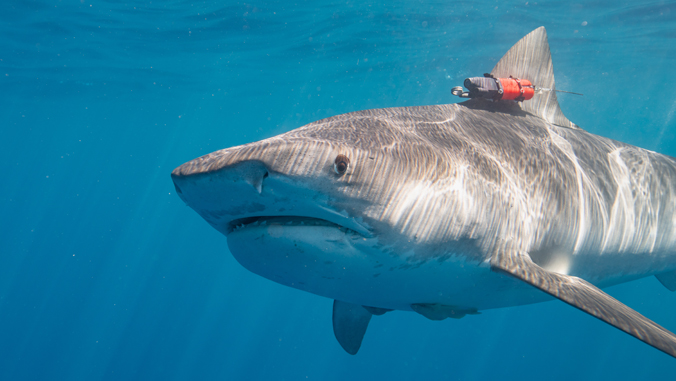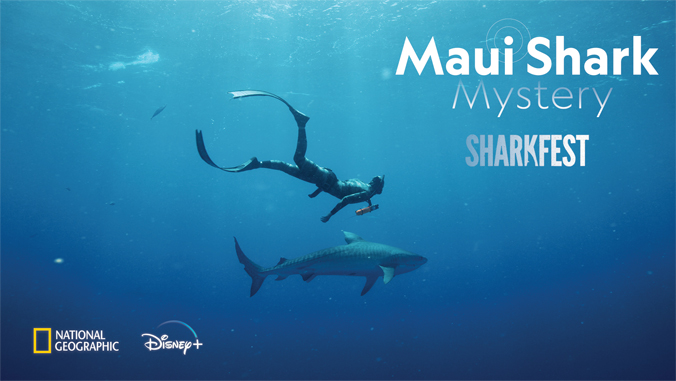
The majority of shark research content is narrated and led by male scientists, and enthusiasts. The focus of a new National Geographic docuseries titled “Maui Shark Mystery,” follows the stories of three female marine biology graduate students at the University of Hawaiʻi at Mānoa. The series aims to gain a better understanding of how and why tiger sharks utilize marine habitats around Oʻahu and Maui Nui.
The three women featured from the Hawaiʻi Institute of Marine Biology (HIMB) Shark Research Lab are Paige Wernli, a PhD candidate; Chloé A. Blandino, a shark husbandry research specialist; and Julia Hartl, a PhD student and research assistant.
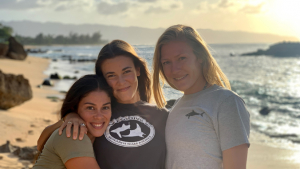
Filming this documentary gave the UH Mānoa graduate students a chance to advance themselves in science, and the opportunity to inspire the next generation of up-and-coming scientists through exemplifying their capabilities as women in shark research.
“For a long time I’ve wanted to change the formula of TV documentaries about sharks to one that gives graduate students the spotlight to talk about their own research and the challenges of doing science,” said Carl Meyer, associate researcher at HIMB. “The graduate students featured in this documentary are inspirational role models for other young women who may be considering STEM careers.”
With a focus on shark ecology in Hawaiʻi, this was an important opportunity for Wernli, Blandino and Hartl to showcase their research to a broad audience and learn about TV wildlife documentary production. The knowledge gained by UH graduate students can help researchers to better protect and conserve sharks.
Maui Shark Mystery premiered on National Geographic / Disney+ on July 11, 4 p.m. HST, and will be available on Disney XD on July 17, 4 p.m. HST and Nat Geo WILD on August 2, 4 p.m. HST.
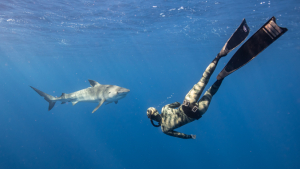
Paige Wernli
Wernli is a PhD candidate in the Marine Biology Graduate Program at UH Mānoa. Her research focuses on investigating the drivers behind a seasonal influx of tiger sharks to Maui Nui during the midwinter months.
“Graduate students do not often get the chance to be the focus of a production like this, so it was a very unique opportunity for a group of us to showcase our research effort and the reality of working on a project like this one,” said Wernli. “All of the late nights, long days, frustration, mistakes, triumph, perseverance and commitment will be on display; which can be intimidating for someone so early in their career but hopefully inspiring for the next generation!”
Chloé A. Blandino
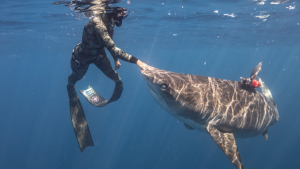
Blandino obtained her master of science in marine biology at UH Mānoa. Her research aims to elucidate how sharks at French Frigate Shoals atoll share resources across time and space, and the possible mechanisms that drive resource sharing (e.g. predator-prey relationships, competition).
“Filming for this documentary was a monumental opportunity in my career trajectory that allowed myself and my team to showcase the reality of conducting science-based shark research,” said Blandino. “Having the privilege to share what we ultimately love to do with a public audience, especially as women working in a male-dominated field, will undoubtedly feel rewarding.”
Julia Hartl
Hartl is on the PhD track in the Marine Biology Graduate Program at UH Mānoa. Her work is focused on the ecology of coastal sharks associated with Oʻahu’s North Shore ecotour sites. The most commonly encountered species are Galapagos and sandbar sharks. Her chapters explore the effects of ecotour growth on the movements, diet and energetics of these animals.
“I am excited to see the fruits of our labor, it’s been a major collaborative effort on all sides,” said Hartl. “I was most excited for the opportunity to do some work in the water and to share a little bit of my background and research objectives with the world.”
